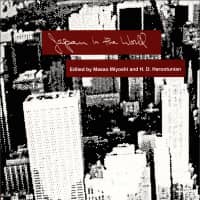Published near the height of Japan's global economic power in 1993, "Japan in the World" brings together essays that reflect on the country's place in international affairs. Editors Masao Miyoshi and Harry Harootunian argue that Japan's economic prowess far outpaces its global cultural and diplomatic standing, in part because of nepotism and corruption. The remaining chapters offer other explanations for this asymmetry, with varying levels of pessimism.
Japan in the World, by Masao Miyoshi and Harry Harootunian.
368 pages
DUKE UNIVERSITY PRESS, Nonfiction.
Historian Tetsuo Najita situates Japan's economic growth in its historical context, explaining that Meiji Era (1868-1912) industrial reforms succeed because they conformed to the country's established mercantile culture. Sociologist Perry Anderson reinforces this view through an extended comparison of Japanese and German modernization. Anderson argues that, while both countries expanded economically, reforms penetrated social structure in Germany more deeply than in Japan. Political scientist Eqbal Ahmad claims that overbearing U.S. policies have also suppressed dissent in Japanese domestic and international affairs.
Other contributors are more optimistic. Literary critic Fredric Jameson praises the work of novelist Natsume Soseki, and historian Miriam Silverberg suggests that Japanese prewar culture was more connected to global movements than is now recognized. Several essays address often neglected ties between Japan and its neighbors.
"Japan in the World" includes a wide range of voices, from novelists to economic historians. It is a valuable analysis of Japan's international image — a topic as complex and contradictory today as in the early 1990s.



















With your current subscription plan you can comment on stories. However, before writing your first comment, please create a display name in the Profile section of your subscriber account page.